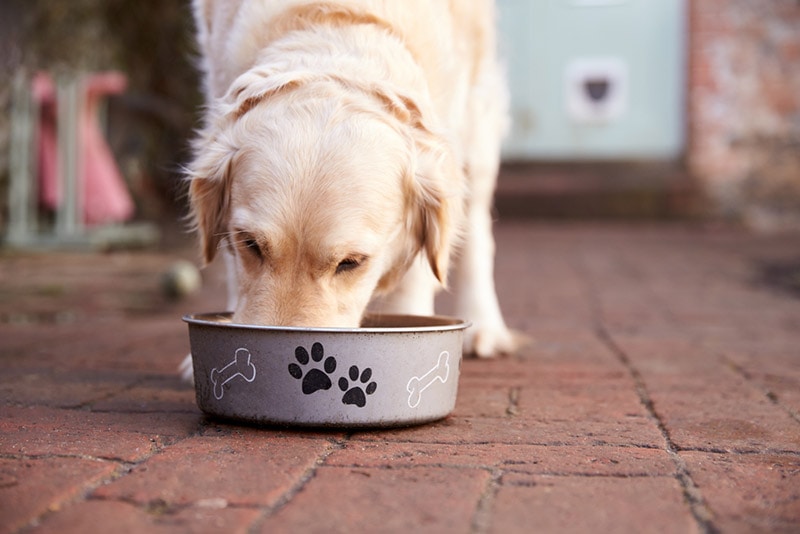Sodium Selenite In Dog Food: Vet-Approved Safety & Concerns
Updated on

Click to Skip Ahead
All dogs require a complete and balanced diet that provides them with the essential nutrients they need to stay healthy. This makes it important to choose dog foods that have beneficial and essential ingredients. When taking a closer look at the ingredients in your dog’s food, you might notice ingredients like sodium selenite are included.
Although the use of sodium selenite in dog food is a controversial subject, it does have a purpose when used correctly which we will discuss in this article.
What Is Sodium Selenite?
Sodium selenite is a colorless salt that is included in many different dog foods. Sodium selenite naturally occurs in soil, plants, and water, but it can be used to manufacture colorless glass or as a dietary supplement. It is the inorganic form of selenium, which is an essential trace mineral required by dogs.
Selenium is important for dogs because it is used for its antioxidant benefits and reproductive, and metabolic functions. 1 Several foods like fish, poultry, and egg are all natural sources of selenium for dogs. Even though your dog’s food might already contain those ingredients, some of the treatments during the food’s manufacturing process reduce the natural selenium content. Therefore, dog food manufacturers still need to incorporate a form of selenium into your dog’s food.
Many dog food manufacturers prefer to use sodium selenite rather than an organic form of selenium because it might be a safer, cheaper, and more practical alternative. Selenium itself is a vital micronutrient to dogs, so there’s no doubt that it is a necessary inclusion in dogs’ food. However, there is controversy about whether sodium selenite is safe for dogs since it can be toxic in high dosages.

How Is Sodium Selenite Given?
Sodium selenite is given to dogs through their food as a dietary supplement because it provides dogs with an essential mineral.
Dog food manufacturers include different nutrients and their organic or inorganic forms in dog food for different reasons. Primarily because the food needs to be complete and balanced for dogs to provide them with essential nutrients they need to be healthy. Some forms of nutrients might be more practical or affordable in their inorganic form, which is why dog food manufacturers may choose to include them instead.
When sodium selenite is included in dog food at respective doses, it is beneficial and safe for dogs. However, it is dangerous to dogs when overdosed.
The AAFCO requires dog foods to contain a maximum selenium concentration of 0.3 mcg per gram on a dry matter basis. 2 Alternatively, 0.35 mg per kg with a maximum concentration of 2 mg per kg based on dry matter. Based on calorie content, a minimum of 00.8 mg per kcal of selenium is recommended for maintenance in adult dogs. The selenium concentration should not exceed 0.5 mg per kcal of selenium for dogs based on the calorie content.
What Happens If Your Dog’s Food Contains Sodium Selenite?
You might be concerned when unnatural-sounding ingredients are used in your dog’s food. It could make the ingredient seem toxic and might even cause you to avoid certain dog foods that contain the ingredient.
Sodium selenite is approved for use in animal diets by the AAFCO, which acknowledges that certain inorganic compounds like selenite can have the elements they offer in their name. This is why sodium selenite has “sodium” in the name, and it is not just labeled as selenium. Sodium selenite itself is not harmful to dogs even though it’s an inorganic form of selenium.

Potential Side Effects of Sodium Selenite
Any form of selenium can be toxic to dogs when overdosed, not just the selenium supplied from sodium selenite. Many vitamins and minerals that are essential for dogs can be toxic in large doses. Since sodium selenite supplies dogs with selenium, overdosing on this substance may cause selenium toxicosis (selenosis).3
- Hair loss
- Rough coat texture
- Garlic breath
- Brittle nails
- Low energy
- Poor development
- Gastrointestinal upset
- Loss of appetite
- Unsteady gait
- Cardiac and kidney failure
It is important to take your dog to an emergency veterinarian if you notice any signs of acute or chronic selenosis.
Benefits of Sodium Selenite (Selenium) for Dogs
Although selenium can be dangerous for dogs in doses that exceed the maximum requirements for pet feeds, it still has noteworthy benefits for dogs.
- Antioxidant properties
- Improved skin and coat condition
- Reduces inflammation
- Aids in thyroid and metabolic functions
- May increase the effectiveness of vitamin E
Frequently Asked Questions (FAQs)
1. Is sodium selenite bad for dogs?
Sodium selenite is not toxic to dogs if it is given in appropriate dosages. If your dog overdoses on sodium selenite, that’s where the problems can start that make this compound controversial. Most reputable dog food manufacturers aim to keep the selenium concentrations within the respective dosages according to the maximum and minimum requirements for dogs.
Unfortunately, there is a thin line between safe and unsafe doses of selenium for dogs. Sometimes only 1 mg per kg of selenium can be associated with toxicosis. This is what makes the addition of sodium selenite a controversial ingredient in dog food.
2. Why is sodium selenite in your dog’s food?
Sodium selenite is included in your dog’s food because it supplies your dog with an essential mineral known as selenium. Your dogs need selenium in their diet because they cannot produce it on their own. Whether they get it from the inorganic or organic form depends on the type of food you feed them and your personal preference. Regardless, your dog must have a source of selenium in their food.

3. Is sodium selenite better than organic selenium?
Some dog owners might prefer to feed their dogs the more organic form of selenium, like selenomethionine from selenium yeast instead. There is also a possibility that selenium yeast is absorbed faster than sodium selenite. So some dog owners may want to feed their dogs a more digestible, potentially safer, and organic form of selenium to their dogs rather than the inorganic form.
Conclusion
The compound sodium selenite supplies your dog with selenium, an essential mineral your dog needs for specific bodily functions. It is safe for dogs at recommended doses but can be toxic in higher doses so additional supplementation is cautioned. However, selenium deficiency seems to be more common than toxicosis. Many commercial dog foods include sodium selenite in appropriate concentrations to prevent your dog from becoming deficient in this mineral.
Featured Image Credit: Chendongshan, Shutterstock













